 |
| blessed Padre Pio |
*** Klediments:
*** A Thousand Brilliant Lies, by Hafiz.
I have a thousand brilliant lies
For the question:
How are you?
For the question:
How are you?
I have a thousand brilliant lies
For the question:
What is God?
For the question:
What is God?
If you think that the Truth can be known
From words,
If you think that the Sun and the Ocean
Can pass through that tiny opening Called the mouth,
O someone should start laughing!
Someone should start wildly Laughing Now
From words,
If you think that the Sun and the Ocean
Can pass through that tiny opening Called the mouth,
O someone should start laughing!
Someone should start wildly Laughing Now
*** Books I have been reading during recovery (in between reality tv shows).
“The Life and Prayers of Padre Pio,” by Wyatt North.
“Padre Pio Under Investigation: The Secret Vatican Files,” by Fr. Francesco Castelli.
“Token of a Covenant.” Hans Graf von Lehndorff’s autobiography and diary,
“Story of a Soul,” A new version of Saint Theresa of Lisieux’s autobiography.
“I Heard God Laughing,” a new translation of the poetry of Hafiz.
*** Markings: "Love is more beautiful in the company of fear, because it is in this way that it becomes stronger. The more one loves God, the less one feels it!....Blasphemies cross my mind incessantly, and even more so false ideas, ideas of infidelity and unbelief. I feel my soul transfixed at every instant of my life, it kills me....My faith is upheld only by a constant effort of my will against every kind of human persuasion....My faith is only the fruit of the continual efforts that I exact of myself. And all of this, Father, is not something that happens a few times a day, but it is continuous. Father, how difficult it is to believe!...I felt two forces clashing within me, tearing my heart: the world wanted me for itself, and God called me to a new life. It would be impossible to describe this martyrdom. The mere memory of the battle that took place within me freezes the very blood in my veins....” Blessed Padre Pio
And so as blessed Padre Pio would pray his Capuchin brothers would lay towels on the floor to soak up the immense flow of tears that streamed from his eyes, and sometimes the blood that flowed from the stigmatas in his hands and feet. A life in Christ, yes, but a life compounded by miracles, betrayal, suspicion, ecstasy, scandal, loneliness, celebrity, and ceaseless prayers from a pierced and fearful heart, this too, as the life of father Pio confirms, is part of the “good news.”
*** “First it's pretty tires, then it's pretty guns...next thing you know, you're shavin' your beard and wearin' capri pants.” Si Robertson from the #1 reality tv show “Duck Dynasty.”
 |
| Me and grand daughter Carlee Rae. |
Although I am pretty much back to work I think that watching a lot of daytime TV for the last few weeks has had more of an adverse effect on me then I realize. Among the cable shows I have watched are an almost frightening amt. of programs celebrating, exposing, promoting, stories of (underclass?) white, male, rural, un-schooled, southern culture posed in various “real life” tableaus. These are the titles of some of the shows: Swampwars, Guntucky, Swampland, Duck Dynasty, Gator Boys, Call of the Wildman, and Swamp’d, to name just a few. There needs to be further reflection on just how these programs mirror and inform contemporary american culture’s desires, fears, and anxieties. But I am wondering if these shows are unique to the USA or if there are reality TV shows starring monosyllabic, intellectual-hating, crooked toothed, back-woods, squirrel-eating old men with long beards in Russia, Australia, France, Denmark, Shanghai, Britain, or Bombay? (fyi Duck Dynasty’s 3rd season premiere was the most watched telecast in american network history, and that suggests that there is a measure of cultural/economic power worth attending too). Oh, Btw, that photo is me and by grand daughter Carlee Rae auditioning for Duck Dynasty’s fourth season!
*** “What is happiness but just a brief moment before we need more happiness.” I got this quote from a commercial for the tv show ‘Madmen,’ which I haven’t seen yet but this one line has got me interested in taking a look at it. This koan about happiness seems like half of a really insightful parable by a great spiritual master, which of course, is what the best advertising writers are.
*** It is a challenge to keep reading Hans Graf von Lehndorff’s autobiography and diary, “Token of a Covenant,” yet I can’t leave it be. Lehndorff was a Surgeon in Konigsburg during the Russian invasion of East Prussia in WWII. Konigsburg (the city of Kant, today called Kaliningrad) was the first German city that the Russians captured in their counter-invasion and the ferocity and horror of their revenge against the German civilian population rightly surpasses our ability to comprehend it. Most Germans were killed and virtually every woman was raped, both living and dead. Some long streets had rows of victims crucified to doors and posts. The conditions and the suffering in the hospitals where Lehndorff tried to care for his patients was often much worse than death. Yet Lehndorff, a member of the confessing church, carried on his work for the most part with diligence, hope, and faith, and saved many lives. His story is profoundly inspiring and at the same time quite depressing.
Many passages in Lehndorff’s journal recount how he frequently encountered Prussians who simply could not confront the catastrophic dissolution of their world. It was so unthinkable that Hitler would sacrifice the city of Kant to the slavic barbarians that one ardent admirer of Hitler said to Lehndorff just a day before the collapse and complete occupation of Konigsburg by the Russians, “...our Fuhrer will never permit the Russians to get to us; he’d rather gas us first!” And so we cling to the small empires of our flesh and cower behind the fortresses of our illusions contrary to so much evidence that an apocalypse is always at hand. Or maybe it just seems that way to me because in the last year or so myself and many of my family, friends, and acquaintances have been struggling with serious illnesses (or death). Nevertheless, it gives me no comfort or peace to read about the great suffering of others. I think it is unwise to try and console people who are suffering by telling them about how much greater some others are suffering. Any relief or peace we can find in our misery should not be obtained at the expense of those more miserable than ourselves. Better to curse God for our suffering then to thank God because someone else’s pain is greater than our own.
*** Hospice Earth (a poem by Daniel Imburgia in remembrance of Job’s wife)
Bodies limits
Doctors falter
Oceans rise without permission
Mortally life evolves
Wind, word trace their wreckage
Fire consumes remainders
Earth’s crust cracks
Minds break
Questioning ends
If we ask Mother
If we finally confess our sins
Eliphaz, Bildad, and Zophar
Will Jehovah give us back our children?
 |
| Saint Therese of Lisieux |
*** These are Saint Therese’s last words as recorded over several hours by Sister Agnes. Dear Theresa was in great agony, coughing up blood, and slowly suffocating to death:
I no longer believe in death for myself; I only believe in suffering.
Oh my God!
I love God!
O my blessed Virgin, come to my aid.
If this is agony, then what is death?
Ah my God. Yes, He is very good.
If you but realized what it is to suffocate.
My God, have pity on me your little child. Have pity.
God is surely not going to abandon me!
Little sisters, my sisters, pray for me.
My God you are so good.
Everything I have written on my desire for suffering is true!
Mother isn’t this the agony? Am I not going to die?
My God I love you....
Mother Agnes wrote: ‘Suddenly her eyes came to life and were fixed on a spot above the statue of the Blessed Virgin. She seemed to be in ecstasy. This look lasted for the space of a ‘Credo.’ Then she closed her eyes and expired.’
I think that I would like to read a reflection that engages Saint Therese of Lisieux in conversation with (saint?) Simone Weil. I am thinking specifically of Weil’s, “The Love of God and Affliction” and perhaps Theres’s “The Trial of Faith.” I would just offer that both Weil and Therese lived their lives in constant conversation with suffering, affliction, and death (both women died from Tuberculosis but in significantly different circumstances). I confess that I am not comfortable with my understanding of what Weil means by “affliction.” She certainly is talking about something more than ordinary human suffering and yet I think that in some ways Therese often talked about our mortal flesh as a kind of affliction that separates us from God. Weil writes something similar saying that, “God can never be perfectly present to us here below on account of our flesh. But he can be almost perfectly absent from us in extreme affliction. This is the only possibility of perfection for us on earth.” This almost perfect absence of God is something that both Saints (really most saints) talked about even though I think that they may have understood and experienced that silent absence differently. Following are two well known quotes by these dear sisters that offer some insight into this difference.
Saint Therese: “[Jesus] permitted my soul to be invaded by the thickest darkness, and that the thought of heaven, up until then so sweet to me, be no longer anything but the cause of struggle and torment. This trial was to last not a few days or a few weeks, it was not to be extinguished until the hour set by God Himself and this hour has not yet come. I would like to be able to express what I feel, but alas! I believe this is impossible. One would have to travel through this dark tunnel to understand this darkness....Then suddenly the fog that surrounds me becomes more dense; it penetrates my soul and envelops it in such a way that it is impossible to discover within it the sweet image of my Fatherland; everything has disappeared! When I want to rest my heart fatigued by the darkness that surrounds it by the memory of the luminous country after which I aspire, my torment redoubles; it seems to me that the darkness, borrowing the voice of sinners, says mockingly to me: “You are dreaming about the light, about a fatherland embalmed in the sweetest perfumes; you are dreaming about the eternal possession of the Creator of all these marvels; you believe that one day you will walk out of this fog that surrounds you! Advance, advance; rejoice in death which will give you not what you hope for but a night still more profound, the night of nothingness.”
Simone Weil: “God created through love and for love. God did not create anything except love itself, and the means to love. He created love in all its forms. He created beings capable of love from all possible distances. Because no other could do it, he himself went to the greatest possible distance, the infinite distance. This infinite distance between God and God, this supreme tearing apart, this agony beyond all others, this marvel of love, is the crucifixion. Nothing can be further from God than that which has been made accursed. This tearing apart, over which supreme love places the bond of supreme union, echoes perpetually across the universe in the midst of the silence, like two notes, separate yet melting into one, like pure and heart-rending harmony. This is the Word of God. The whole creation is nothing but its vibration.”
Most of the time I seem to find more meaningful communion with those who are ‘poor in spirit‘ and staggering through the darkness like I am regardless of any beliefs (or lack of beliefs). I think that puts me closer to Simone Weil than Saint Therese (or Padre Pio, Hafiz, or Baron von Lehndorff) and yet at the end I think that they all heard that same terrible sound of the universe being torn apart by a love that we can’t fully understand this side of the veil. Hafiz wrote:
A Divine Invitation
You have been invited to meet
The Friend
No one can resist a Divine Invitation
That narrows down all our choices
To just two:
We can come to God
dressed for Dancing
Or
Be carried on a stretcher
To God’s ward.
I would guess that Saint Theresa was dressed for dancing, and that Simone Weil was carried in on a stretcher (and that gives me hope).
Obliged.




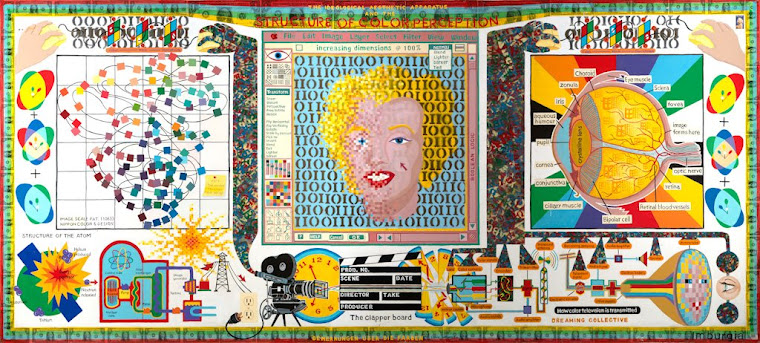
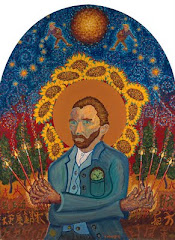


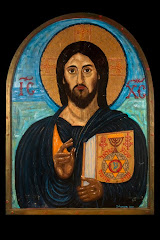
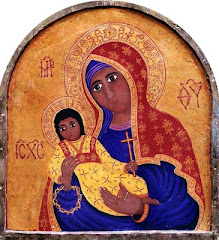

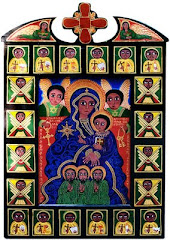

No comments:
Post a Comment